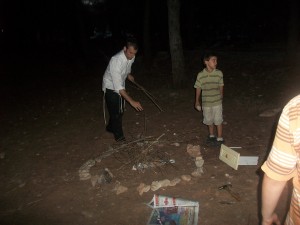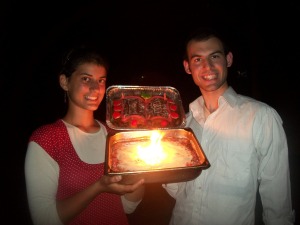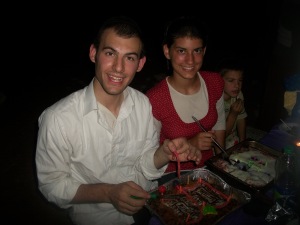Over a year ago, I called a Karmiel real estate agent and told her we wanted to buy an apartment from the US, without seeing it first. She humored me, but her husband later told me that she never thought I’d follow through – she gets lots of calls from people interested in real estate, but to buy from the US is something that none of her clients had done before. However, she soon realized that I wasn’t flaky and that my reasoning was very well-thought out, so much so that she repeatedly told me that what I was doing was so smart, that it was a shame others making aliyah didn’t do the same thing.
This past Shabbos, I hosted a family who just made aliyah and bought their apartment before arriving. I asked her what made her do that, since it’s an unusual choice, and other than me, my mother, and a blog reader, no one making aliyah to this community has chosen to do this. She said that she used the same real estate agent that I did (as did my mother and blog reader), and this was her recommendation! (The agent’s company wrote an article in an Israeli paper about us buying an apartment in this way- giving way too many details about our family, apartment location and price – and announced that they were now offering the service of helping new immigrants buy from abroad.) The mortgage broker that my mom used is now making the same recommendation. 🙂 I know this is something that isn’t an option for many people, but it’s actually a lot more doable if done before coming than it may seem, and so I’ll share my reasoning on this.
Real estate in Israel is expensive. Most people aren’t in a position to buy a home in cash, and will need to take out a mortgage in order to finance the purchase of a home. To buy your home here, you’ll need two things: a) typically, a down payment of 30% – 40%; and b) a mortgage qualification. If you don’t have these two, then you’ll need a third thing – a friend or family member with a very high income who will co-sign, and/or give you the money for the down payment.
1) Down payment – obviously many people aren’t going to have the necessary funds for a down payment. However, many do have a chunk of money that could go toward a down payment, but it gets used up long before they’re in a position to buy a home. Additionally, new immigrants receive a sum of money as part of their absorption benefits that could go toward a purchase. Since the absorption benefits are only received once a person arrives in Israel, to do this, one would have to borrow from private individuals and then repay them with these funds when they get it. Generally, people go through their absorption benefits with little to show for it in the end, and I think this is often a missed opportunity.
To qualify for a mortgage, you need to have a documentable salary for a given period of time – this depends, but I believe they like to see two years at the same job at a certain salary level. This understandably becomes a big obstacle for new immigrants once they arrive, because they’re no longer working at their US jobs, and it can take a long time to find work in Israel. Once they do find work, it can take time to work up to a salary that is high enough to qualify for what they want to purchase.
We didn’t move here while continuing to work for the same company by telecommuting (in which case a family will have no problem documenting continual earnings at the same level), and we had no idea how long it would be before we were able to qualify for a mortgage. However, by buying while my husband was still working in the US, we were able to qualify for a mortgage based on his current salary. Unless you are unemployed in the US, then this is an advantage that you’ll also have. Even modest US salaries tend to be higher than Israeli salaries – for example, $40 – 50,000 isn’t considered a lot in America for a family but is a very nice salary in Israel and will be adequate to qualify you for a mortgage, combined with your down payment.
NBN will strongly advise against doing something like this, saying that it’s risky and you’re better off renting first to see where you want to live. This isn’t bad advice, but I feel it doesn’t take into account the long term picture. Many families end up financially unable to buy a home after taking this approach, families that could have done it if they were given a different understanding of the realities involved. Recently, I spoke at length to a family moving back to the US a couple of years after making aliyah. I asked why, and one thing he shared was that they were never going to be able to buy a home. This was a family in the US who was financially comfortable, had sizable savings, had earnings in the six figure range – and yet after two years realized they’d never be in a position to buy a home here. Their savings were gone, they hadn’t yet found work that paid more than a minimal salary, and they were right, they had no prospects for home buying in their situation (which is common to olim). So there are some points worth seriously considering in order to make a well-balanced decision about if you should buy or rent when moving to Israel.
– When you rent a home in Israel, you’re generally doing it sight unseen before your arrival, through an agent who helps you find it before you get here. Or you do it after arriving, staying in the luxurious (strong sarcasm :)) Absorption Center, if they have one where you live (most of these centers throughout Israel are no long in operation but we do have on here in Karmiel), and get to briefly tour it before making a year long commitment. Either way, you won’t know much about your apartment, your neighbors, or your neighborhood until you’ve been living there a while. After your lease is up, you can reevaluate if this is where you want to be.
There’s no difference in this case between renting or buying. Buying a home in an area doesn’t mean you’re committed to stay there. You have to live somewhere for the first year! If you buy a home and then decide you’d rather live somewhere else, you can move and rent out the home you bought, while renting somewhere else.
– Regardless of if you choose to live in the home that you purchased, your money is working for you in the Israeli real estate market while you were deciding where you want to live. While past performance is no guarantee of future results, Israeli real estate has moved upward pretty consistently. In the year + since we bought our home, prices have steadily risen here in Karmiel, and if I had waited until now to buy (assuming that I was able to qualify for a mortgage and still had a down payment to work with, which wouldn’t be realistic but anyway), the price of an apartment like mine would in all likelihood be out of our price range now. A delay would have meant we’d have to buy something smaller, in a less desirable neighborhood, or worse condition.
– The risk factor of buying a home unseen can be moderated by taking some precautionary measures. Firstly, we used a real estate agent as well as a real estate lawyer to be sure everything was on the up and up. We hired a contractor to check out the apartment and give us a detailed report of its condition before we made an offer. This is unusual in Israel, but I felt the money spent was worth the peace of mind, and when I had power of attorney for my mother and took care of her apartment purchase, I did the same thing.
You can also have the agent send you pictures of the homes you’re interested in, or have a friend who lives in the area look at homes for you. (My oldest daughter was studying here at the time, and visited the apartment and took pictures as well as gave us her feedback on what she saw.) Sometimes pictures look great and the reality isn’t so rosy. A good real estate agent is going to tell you about all of the problems with the apartment, because she’s not going to gain by you purchasing something that you end up feeling misled about.
– We used a mortgage broker to assist us with our purchase from abroad. This also added in another level of help and security – there was someone else looking out for us with regards to the bank. All mortgage brokers are not created equal. We initially spoke with one person, who after hearing our financial details assured us we would be able to buy a home with 10% down. We went about looking at homes based on this figure. In subsequent conversations, he then told us we needed 20%, then 30%, then 30% with co-signers, then 30% with high earning co-signers who would finance 10%of the down payment. We didn’t have co-signers and we definitely didn’t want to ask anyone to put any of their own money into our home purchase, and it looked like we weren’t going to be able to go through with our purchase.
I called a friend of ours in Israel who was a real estate investor for many years in the US before moving to Israel, where he has continued to work in real estate. He gave me the suggestion of a different mortgage broker – interestingly, from the same office as the first! – and it was working with this broker that made all the difference. (I later learned the first broker typically worked with young couples buying expensive homes financed by their parents -very much not our situation.) The broker he recommended has a lot of experience with non-traditional buying situations, and enjoys the challenge of helping people navigate difficult situations. If you’re buying from overseas, you’re already not a typical buyer and I’d highly recommend using someone with lots of experience. Things can and will go wrong, and you need someone who understands this is the norm, and can deal with it. The broker we used was Adam Siegel, and his number in Israel is 052-714-4056, asiegel@mortgageisrael.com. If you contact him, let him know I recommended him. He was experienced, hardworking, honest, kept his cool in frustrating situations, and was a pleasure to deal with. I really don’t think we would have been able to buy a home without his help, and I’m happy to pass his information on to others so they can also be helped through this challenging process. (In case you’re wondering, I’m not getting referral fees, and he doesn’t even know I’m writing this.) He works with people buying all over Israel.
I’ve also been asked about what real estate agent I used. She only works with sales properties in Karmiel, not rentals. Her name is Tamar Sobel, and her contact information is 052-760-7416; tamar.remax@gmail.com. In our case, Tamar took care of extra details for us that we compensated her for in addition to the regular fee. Again, she is very honest and hardworking, and truly cares about the families she works with. She was a huge part of the success of our apartment purchase, which everyone involved in said was objectively very challenging – everything that could go wrong seemed to go wrong, and more! Again, tell her I recommended her if you contact her.
Part of our decision to buy in advance was my desire to give my kids as much stability as we could during the transition process to living in Israel. The rental market in Karmiel was – and still is – very tight. What landlord would choose to rent to a family of 11 when they could rent to a family of 3 or 5? I knew that if we did find something, we still didn’t know how long we’d be able to stay there before the rent would go up or neighbors would complain or the landlord wanted to sell it. By buying an apartment, our kids had a sense that this is our home and this is where we’ll be. There was the intangible factor of emotional security that we were able to give them.
Americans don’t realize how important home ownership is in Israel. Housing costs are usually your highest expense, and this will constantly rise if you’re renting. Your mortgage will generally be lower than what you’d pay in rent, and much more stable. That’s not to say that you can’t live here happily and rent – of course you can! But there’s a financial stability that comes with purchasing a home that is very helpful in the short and long term, and this is why there’s so much pressure to help newly married children purchase homes. It’s very hard to make it financially if your housing costs spiral up faster than your income. That’s also why last summer there were the widespread tent protests, because so many Israelis are feeling like a home purchase is out of their reach.
Buying a home from abroad took time and effort, and added another of complexity to our aliyah preparations. But to get off the plane and be able to go right into our own home was a great feeling, and it’s something we’re continually grateful that we did. I’m not telling anyone to do what we did, but I do strongly recommend that you consider it seriously to see if you have a way to do this. Many people have savings, an inheritance, helpful relatives, or proceeds from a home sale that will give them the necessary down payment.
Even if at first you don’t think there’s any way you can do this – when we were told we’d have to come up with 30%, my first thought was it was impossible – think creatively! I asked Hashem for help constantly, and kept picturing us having the money we needed. It came about through very normal and mundane channels – no rich relatives or lottery winnings, not even absorption benefits or personal loans – and I had to put in a lot of effort and time, but it began with us knowing what we wanted and being willing to think ‘how’ instead of assuming it was impossible.
Avivah





